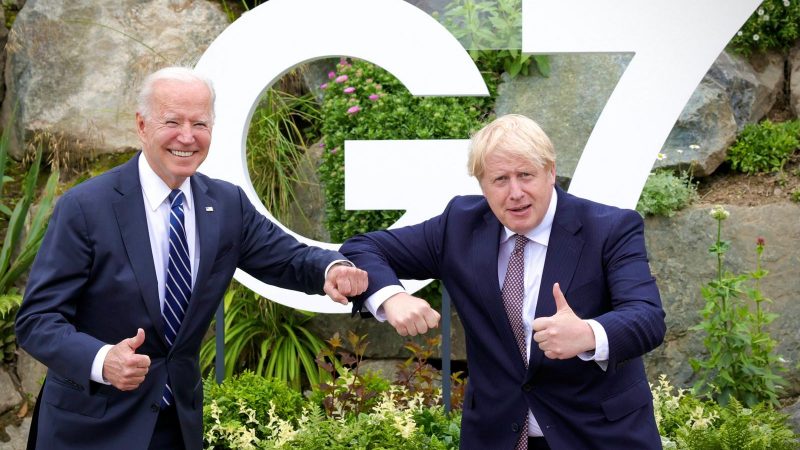
Boris Johnson and G7 leaders had a chance to save countless lives this weekend by agreeing a comprehensive plan to vaccinate the globe against Covid, build back a more equal world and tackle climate change. He, and they, failed. As Gordon Brown said in interviews on Sunday, the summit communique represented an unforgivable moral failure: “Millions of people will go unvaccinated and thousands of people, I’m afraid, will die.”
Charities who have been responding to the pandemic around the world had set three tests for the pandemic: To donate more doses, to waive IP rights so more of the world can manufacture the vaccine themselves and, most crucially of all, to provide the financing needed to deliver a proper plan to vaccinate the world’s poorest people.
Whilst the pledge to donate one billion doses – including 500m donated by the Biden administration – was welcome, most will not arrive until next year and it is nowhere near the 11 billion the WHO is calling for. Whilst the Biden administration has said IP rights for the vaccines should be waived, Johnson and other European leaders refuse to budge. But worst of all, the G7 agreed nothing towards the estimated $60bn needed for a two-year vaccine and healthcare support package.
The failures extend to climate, too. The G7 was an opportunity to make good on the promise to give $100bn a year in climate finance to low income countries from 2020 onwards, building goodwill ahead of the crucial climate talks in Glasgow later this year. The G7 are about to get $100bn in special drawing rights from the IMF’s reserves – money that will not cost a penny or add to their national deficits. Why did they not commit to pass this money on? Plans for a green global infrastructure plan are positive, particular if they offer an alternative to China’s ‘debt trap diplomacy’, but contained no details on how it will be financed.
The G7’s backing for a global minimum corporate tax rate is undoubtedly welcome, but unfortunately here too there is cause for concern. The mechanism that would be used would ensure the G7 themselves take the lion’s share. Sunak watered down US proposals for a 21% rate down to 15%, and has immediately started lobbying for the City of London to be exempt. According to the Tax Justice Network, this means the new tax would generate $255bn less than it could have for countries outside the G7.
What happened to Johnson’s promise to “vaccinate the world” and for a “climate Marshall plan”? Why didn’t this happen? Because of Johnson’s laziness and Sunak’s leadership ambitions. Johnson never put a plan for funding vaccines on the table. President Biden should have insisted one was discussed, in our view – but nonetheless Johnson was host and chair of the summit: the buck stops with him. Instead of putting in the hard graft in the weeks before, he was going on honeymoon (good for him, but could it not have waited until later in the summer?).
Meanwhile Sunak’s drive to replace him is the best explanation for why he undermined this summit before it had even begun by cutting the aid spending target and watering down the global tax proposals. Neither move makes economic sense, and they indeed contradict one another. There is no need to cut aid, or any other form of austerity, at a time when borrowing costs are among the lowest they’ve ever been. And if reducing the deficit were the priority, why weaken something that would bring in billions of tax revenue? He is more interested in chasing votes in a future leadership contest than making the right moral or economic decisions.
How should Labour respond? The immediate priority is winning a vote in parliament to force a return to 0.7%. We encourage Labour MPs to keep reaching across the aisle and urge Tories to join Andrew Mitchell’s rebellion, and for Labour members in Tory-held seats to contact their MPs. Shadow Chancellor Rachel Reeves has been leading calls for a global corporation tax, and now we need to push for that tax to benefit poorer countries as well as Britain’s public services. We have to keep pressing for a Glasgow climate summit that delivers the support vulnerable countries are promised.
Most of all, the failure of this summit is a reminder of why winning power matters. When a Labour government hosted the 2005 G8 summit and the G20 London summit, they delivered historic changes that transformed millions of lives and rescued the global economy. LCID remains as determined as ever to help Labour get back into government and change lives for the better once again.


More from LabourList
Andy Burnham manifesto: Greater Manchester mayor reveals three key election pledges in bid for third term
‘Labour should grasp the chance to secure EU visa deal for young workers’
‘How Labour could win a Milton Keynes majority for the first time in decades’